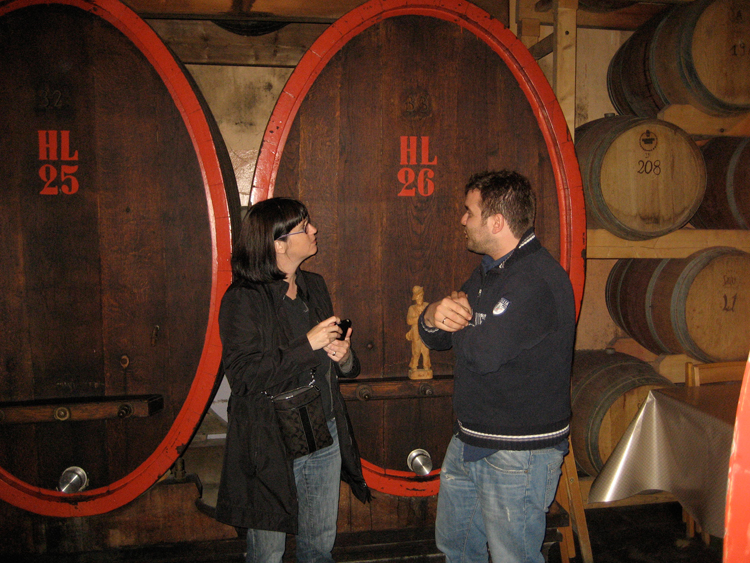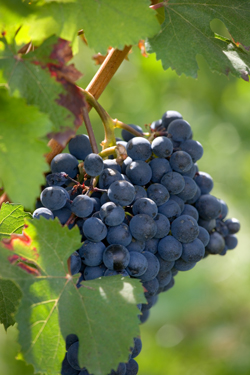
Other Important Red Wines of Piemonte
Roero
Made from a of minimum 95% Nebbiolo with up to 5% Arneis allowed, however most producers do not blend. In recent years some producers of Roero wines have been giving Barolo and Barbaresco a run for their money.
Langhe Rosso
 Made either from 100% of the stated varietal on the bottle e.g. Barbera, Dolcetto, etc. but if blended no varietal will be shown and a fantasy name used. This DOC is often used by producers to make wines outside existing DOC/DOCG regulations. A very large DOC surrounding the town of Alba and overlapping many other zones.
Made either from 100% of the stated varietal on the bottle e.g. Barbera, Dolcetto, etc. but if blended no varietal will be shown and a fantasy name used. This DOC is often used by producers to make wines outside existing DOC/DOCG regulations. A very large DOC surrounding the town of Alba and overlapping many other zones.
Nebbiolo d’Alba
No blending allowed. A large DOC on both sides of the Tanaro River taking in most of the Roero zone to the west and the area around Alba to the east but of course excluding both Barolo and Barbaresco. A value alternative to Barolo and Barbaresco
Barbera d’Asti
Minimum 85% Barbera although most producers do not blend. Dolcetto, Grignolino and Freisa are occasionally added. The Asti DOC is much larger than that of Alba, and with blending, produces a larger range of styles and flavours; sometimes fruitier and fatter
Barbera d’Alba
No blending allowed. Barbera is Piemonte’s most planted varietal and can be grown almost anywhere. It is native to the Monferrato hills east of Alba. Historically loved by the impoverished peasant growers for it’s embarrassingly high yields.This full bodied high acid wine is very food friendly.
Dolcetto
No blending allowed. Grown in 7 DOC’s with Dolcetto di Dogliani the most serious followed by Dolcetto d’Alba. Sometimes called “the Beaujolais of Piemonte” although it can produce very full-bodied, high alcohol wines. Most see no time in oak, however some producers will age in 2 or 3 year old used oak. This deep purple, high acid, ripe berry flavoured wine is usually drunk young
Roero
Made from a of minimum 95% Nebbiolo with up to 5% Arneis allowed, however most producers do not blend. In recent years some producers of Roero wines have been giving Barolo and Barbaresco a run for their money.
Langhe Rosso
 Made either from 100% of the stated varietal on the bottle e.g. Barbera, Dolcetto, etc. but if blended no varietal will be shown and a fantasy name used. This DOC is often used by producers to make wines outside existing DOC/DOCG regulations. A very large DOC surrounding the town of Alba and overlapping many other zones.
Made either from 100% of the stated varietal on the bottle e.g. Barbera, Dolcetto, etc. but if blended no varietal will be shown and a fantasy name used. This DOC is often used by producers to make wines outside existing DOC/DOCG regulations. A very large DOC surrounding the town of Alba and overlapping many other zones.Nebbiolo d’Alba
No blending allowed. A large DOC on both sides of the Tanaro River taking in most of the Roero zone to the west and the area around Alba to the east but of course excluding both Barolo and Barbaresco. A value alternative to Barolo and Barbaresco
Barbera d’Asti
Minimum 85% Barbera although most producers do not blend. Dolcetto, Grignolino and Freisa are occasionally added. The Asti DOC is much larger than that of Alba, and with blending, produces a larger range of styles and flavours; sometimes fruitier and fatter
Barbera d’Alba
No blending allowed. Barbera is Piemonte’s most planted varietal and can be grown almost anywhere. It is native to the Monferrato hills east of Alba. Historically loved by the impoverished peasant growers for it’s embarrassingly high yields.This full bodied high acid wine is very food friendly.
Dolcetto
No blending allowed. Grown in 7 DOC’s with Dolcetto di Dogliani the most serious followed by Dolcetto d’Alba. Sometimes called “the Beaujolais of Piemonte” although it can produce very full-bodied, high alcohol wines. Most see no time in oak, however some producers will age in 2 or 3 year old used oak. This deep purple, high acid, ripe berry flavoured wine is usually drunk young
